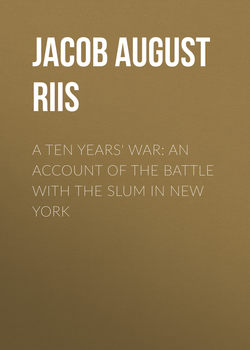A Ten Years' War: An Account of the Battle with the Slum in New York

Реклама. ООО «ЛитРес», ИНН: 7719571260.
Оглавление
Jacob August Riis. A Ten Years' War: An Account of the Battle with the Slum in New York
I. THE BATTLE WITH THE SLUM
II. THE TENEMENT HOUSE BLIGHT
III. THE TENEMENT: CURING ITS BLIGHT
IV. THE TENANT
V. THE GENESIS OF THE GANG
VI. LETTING IN THE LIGHT
VII. JUSTICE FOR THE BOY
VIII. REFORM BY HUMANE TOUCH
Отрывок из книги
In a Stanton Street tenement, the other day, I stumbled upon a Polish capmaker's home. There were other capmakers in the house, Russian and Polish, but they simply "lived" there. This one had a home. The fact proclaimed itself the moment the door was opened, in spite of the darkness. The rooms were in the rear, gloomy with the twilight of the tenement, although the day was sunny without, but neat, even cosy. It was early, but the day's chores were evidently done. The teakettle sang on the stove, at which a bright-looking girl of twelve, with a pale but cheery face, and sleeves brushed back to the elbows, was busy poking up the fire. A little boy stood by the window, flattening his nose against the pane and gazing wistfully up among the chimney pots where a piece of blue sky about as big as the kitchen could be made out. I remarked to the mother that they were nice rooms.
"Ah yes," she said, with a weary little smile that struggled bravely with hope long deferred, "but it is hard to make a home here. We would so like to live in the front, but we can't pay the rent."
.....
Four families live on these floors, with Heaven knows how many children. It was here the police commissioners were requested, in sober earnest, some years ago, by a committee of very practical women philanthropists, to have the children tagged, so as to save the policemen wear and tear in taking them back and forth between the Eldridge Street police station and headquarters, when they got lost. If tagged, they could be assorted at once and taken to their homes. Incidentally, the city would save the expense of many meals. It was shrewdly suspected that the little ones were lost on purpose in a good many cases, as a way of getting them fed at the public expense.
That the children preferred the excitement of the police station, and the distinction of a trip in charge of a brass-buttoned guardian, to the Ludlow Street flat is easy enough to understand. A more unlovely existence than that in one of these tenements it would be hard to imagine. Everywhere is the stench of the kerosene stove that is forever burning, serving for cooking, heating, and ironing alike, until the last atom of oxygen is burned out of the close air. Oil is cheaper than coal. The air shaft is too busy carrying up smells from below to bring any air down, even if it is not hung full of washing in every story, as it ordinarily is. Enterprising tenants turn it to use as a refrigerator as well. There is at least a draught of air, such as it is. When fire breaks out, this draught makes of the air shaft a flue through which the fire roars fiercely to the roof, so transforming what was meant for the good of the tenants into their greatest peril. The stuffy rooms seem as if they were made for dwarfs. Most decidedly, there is not room to swing the proverbial cat in any one of them. In one I helped the children, last holiday, to set up a Christmas tree, so that a glimpse of something that was not utterly sordid and mean might for once enter their lives. Three weeks after, I found the tree standing yet in the corner. It was very cold, and there was no fire in the room. "We were going to burn it," said the little woman, whose husband was then in the insane asylum, "and then I couldn't. It looked so kind o' cheery-like there in the corner." My tree had borne the fruit I wished.
.....